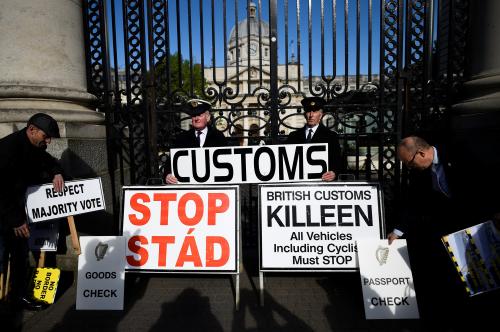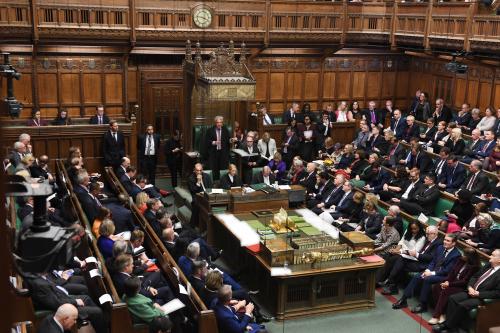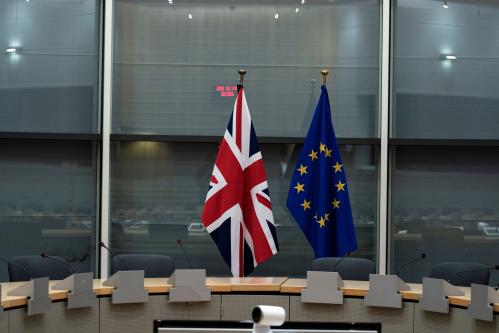Amanda Sloat testifies before the House Foreign Affairs Subcommittee on Europe, Eurasia, Energy, and the Environment on protecting the Good Friday Agreement from Brexit. Read the full testimony below or watch it live.
Chairman Keating, Ranking Member Kinzinger, distinguished members of the subcommittee, thank you for the invitation to discuss to discuss the importance of protecting the Good Friday Agreement from Brexit. Although Northern Ireland was rarely discussed during the 2016 Brexit referendum campaign, the challenge of addressing the region’s unique status has become the biggest obstacle to finalizing the United Kingdom’s (U.K.) withdrawal from the European Union (E.U.). Northern Ireland is now frequently cited as a complication to be addressed in the Brexit context. But there has been insufficient consideration of how these contentious debates have already adversely affected the region, as well as the potential political and economic costs in the future. Although the United States served as an honest broker in Northern Ireland for years, the Trump Administration’s enthusiasm for Brexit has precluded it from playing this role now.
Good Friday Agreement
When the Republic of Ireland gained independence from the U.K. in 1921, the six northern counties comprising Northern Ireland remained part of the U.K. Its constitutional status has remained contested between the Protestant and predominantly unionist community, and the Catholic and largely nationalist community. This dispute resulted in decades of political violence and turmoil, known as the Troubles, which cost over 3600 lives.
The April 1998 signing of the Good Friday Agreement/Belfast Agreement1 enabled a comprehensive approach to governance and security. It took constitutional debates off the table by declaring that Northern Ireland will remain part of the U.K. unless there is “the consent of a majority of the people of Northern Ireland voting in a poll.” On the security side, the U.K. government reduced its military presence (including dismantling army posts and watchtowers) and paramilitary groups decommissioned their weapons. The creation of a 108-member assembly with a power-sharing executive ensured both communities were represented in decision-making. The E.U. membership of the U.K. and Ireland made this fragile peace more viable by enabling connections and removing physical, economic, and psychological barriers. The E.U.’s single market coupled with the peace process permitted the gradual dismantling of customs posts and checkpoints along the border.
The Agreement, which marked its 20-year anniversary in April 2018, did not fully resolve past tensions. There were no peace commissions or reconciliation efforts, nor has there been a durable answer to the constitutional question. Yet Northern Ireland slowly began moving in the right direction. The new assembly focused on routine issues of governance. There was an influx of foreign investors, with Invest Northern Ireland counting nearly 900 international companies employing around 100,000 people.2 Belfast, which was named by Lonely Planet as the best travel destination in 2018, opened a museum about the locally constructed Titanic, served as the location for “Game of Thrones” and other media productions, and attracted boutiques and hipster cafes to its city center. Relations also improved between the U.K. and Ireland, aided by the Agreement’s creation of “east-west” (British-Irish) institutions that enabled cross-border coordination of policies (such as on agriculture and the environment) and “north-south” institutions on the island. Queen Elizabeth made a state visit to Ireland in May 2011, the first trip by a British head of state since Irish independence. Unfortunately, Brexit debates have negatively affected these areas of progress.
Irish border conundrum
A narrow majority of voters in the U.K. opted to leave the European Union in a June 2016 referendum. The complexities of Northern Ireland’s unique status have hindered efforts to finalize the divorce. As an E.U. member, the U.K. is part of its customs union and single market. After Brexit, it will leave both — raising the status of the Irish border to a customs border with associated checks and controls. In order to prevent this outcome given its negative practical and psychological effects, E.U. leaders and then-U.K. Prime Minister Theresa May agreed on a “backstop” provision. It said that unless and until alternative mechanisms were developed, the U.K. must remain in a customs union with the E.U. and Northern Ireland must comply with single-market regulations on goods.3 The backstop proved unpopular domestically, contributing to parliament’s rejection of May’s deal three times. Northern Ireland’s Democratic Unionist Party (DUP), whose 10 MPs were propping up May’s minority Conservative government, opposed a special status for the region. Hardline Brexiteers feared the country could remain bound indefinitely by E.U. rules and unable to negotiate free trade deals.
When Boris Johnson replaced May as prime minister last July, he vowed to revise the Brexit deal. Last week, he reached agreement with E.U. leaders to remove the backstop and replace it with a revised protocol for Northern Ireland4 that would take effect as soon as the transition period ends (currently expected on December 31, 2020). Northern Ireland will remain in the U.K.’s customs territory and Value Added Tax (VAT) area, yet it will align with the E.U.’s rules in these areas. It will also remain mostly aligned to the E.U.’s regulations for goods. Four years after the end of the transition, the Northern Ireland Assembly will vote on whether to continue these arrangements.5 With the exception of the consent mechanism, the protocol is similar to the Northern Ireland-only backstop initially proposed by the E.U. and rejected by Theresa May.
Northern Ireland’s Democratic Unionist Party (DUP) opposes the region’s differential treatment, including the application of E.U. VAT rates and the introduction of a customs border in the Irish Sea, as well as the complex consent mechanism. Although the protocol is more favorable for the U.K. overall, it has raised broader concerns about the longer-term effect of these mechanisms on Northern Ireland. The former British negotiator to Northern Ireland, Jonathan Powell, was sympathetic to DUP concerns.6 He noted the border in the Irish Sea would grow as the U.K. diverges in regulatory terms, while the introduction of simple majority voting could undermine the principle of cross-community governance. Yet Lord David Trimble — the former leader of the Ulster Unionist Party (UUP) and former First Minister of Northern Ireland who opposed the backstop — has urged the DUP to support the revised deal, which he believes is consistent with the Good Friday Agreement.7 The DUP is not propping up Johnson’s government, which is far short of a majority given several Conservative defections and the expulsion of members who voted against the government; however, the party’s opposition requires Johnson to find supporters elsewhere.
At the time this testimony was submitted, it was unclear if the British parliament would ratify the revised deal. The U.K. government, as mandated by parliament, has asked the E.U. to extend the current October 31 deadline to prevent a no-deal Brexit.
Consequences of Brexit
If the U.K. leaves the European Union, there will be political and economic consequences across the country. However, Northern Ireland will be uniquely affected given its shared border with an E.U. member state and history of conflict.
Economy: Brexit will create economic unique challenges for Northern Ireland. Agriculture is the most complex sector, as it comprises 35 percent of the region’s exports (with nearly a quarter of exports going to Ireland versus less than 2 percent moving the other direction).8 As it operates on an all-island basis, U.K. withdrawal from the E.U.’s single market will affect supply chains and processing as well as migrant labor. A no-deal Brexit would create significant economic risks, including the projected loss of 40,000 jobs and an estimated decline in exports to Ireland of 11 percent to 19 percent.9Health: Although health is not an E.U. competence, it could be affected by decisions about the Irish border. Given high cost and limited demand, there has been a growth in all-island healthcare since the Good Friday Agreement. For example, the closure of children’s heart surgery services at a Belfast hospital in 2015 led to the creation of an all-island pediatric cardiology service in Dublin. Brexit raises questions about access to specialist medical services, free movement of doctors, and mutual recognition of professional qualifications.10Citizens’ rights: Brexit will adversely affect numerous rights, including equality rights enshrined in the Good Friday Agreement, fundamental rights deriving from E.U. membership (e.g., E.U. Charter of Fundamental Rights), and labor and employment rights deriving from E.U. law.11 The most prominent concern is the handling of the Agreement’s provision that allows those born in Northern Ireland to hold British passports, Irish passports, or both.
Polarized attitudes: Almost 56 percent of voters in Northern Ireland preferred to remain in the E.U. The very idea of Brexit has destabilized politics by forcing people to choose sides between the British and Irish governments. The clever compromise at the heart of the Good Friday Agreement enabled people to take a break from identity politics: unionists remained part of the U.K. and felt reassured that the province’s status could only be changed at the ballot box, while nationalists felt Irish and had a greater say in local affairs. Brexit has brought back the old polarization, including questions about the region’s constitutional future. A September poll by Lord Ashcroft found 51 percent in favor of joining Ireland (an increase from 46 percent when those who don’t know or wouldn’t vote are excluded), with results divided along community lines.12 More than half of those surveyed believe Brexit strengthens the case for Irish unification, with nearly two-thirds thinking it is more likely “in the foreseeable future.”
Governance: Although the DUP and Sinn Féin (the largest nationalist party in Northern Ireland) were on opposite sides of the Brexit debate, they sent a joint letter13 to Prime Minister May several months after the referendum with shared concerns about its impact on Northern Ireland. The region’s voice has been absent in these discussions since January 2017, when the power-sharing executive — a key component of the Good Friday Agreement — collapsed after disagreements between these parties over mismanagement of a green energy program. Repeated attempts to restore the government have failed, amid disagreements over the Irish Language Act14 and the polarizing nature of Brexit politics. Practically speaking, there is currently no government15 in Belfast: civil servants keep the lights on but are reluctant to make politically sensitive decisions, the U.K. secretary of state for Northern Ireland has nominal oversight, and Westminster passed a budget to keep the region solvent. If there was a no-deal Brexit, Britain’s top civil servant recommended imposing direct rule to manage the consequences;16 although London reclaimed decision-making authority from Belfast at various points during the first decade after the agreement, suspending the devolved government now would be contentious.
Security: Northern Ireland remains a post-conflict society: less than 7 percent of children attend integrated schools,17 punishment beatings by paramilitary organizations increased 60 percent from 2013-2017,18 and there are more “peace walls” (separation barriers between neighborhoods) now than in 1998.19 This spring, there were clashes in Londonderry/Derry, following a police raid on suspected dissident republican groups, and journalist Lyra McKee was shot dead.20 Despite the heightened tension amid Brexit debates, a return to large-scale violence is unlikely. However, police chiefs have long warned that any customs-related infrastructure on the border would be attacked.21Relations with Dublin: Brexit has soured Dublin’s relations with London, amid protracted wrangling over Brexit arrangements. Memories of the Troubles have faded in England, despite decades of deadly terrorist bombings, with some English politicians causing outrage with comments revealing their ignorance of Northern Ireland sensitivities.22 British and Irish diplomats will need to find new ways to structure their engagement over shared policy interests, as the U.K.’s departure from the EU means officials will no longer interact regularly at meetings in Brussels.
U.S. engagement
For decades, there was a bipartisan consensus in Washington about the importance of promoting and preserving the peace process in Northern Ireland. Presidents Jimmy Carter and Ronald Reagan expressed support for a peaceful resolution to the conflict and offered economic assistance, with the latter overseeing the establishment of the International Fund for Ireland. In recent years, the U.S. administration provided envoys to help facilitate the peace process. George Mitchell — President Bill Clinton’s Envoy for Northern Ireland — helped broker the Good Friday Agreement. Richard Haass — President George W. Bush’s Envoy for Northern Ireland — helped save the agreement when it was faltering over slow progress on decommissioning, leading to the historic announcement by the Irish Republican Army (IRA) on October 23, 2001 that it had begun putting its weapons beyond use. Gary Hart — President Barack Obama’s Envoy for Northern Ireland — supported talks that prevented the collapse of the devolved institutions and resulted in the Stormont House Agreement in December 2014; Haass and Meghan O’Sullivan (a Harvard professor who served as a senior official in the Bush administration) facilitated an earlier round of talks. The envoy position has remained vacant in the Trump Administration, with former Secretary of State Rex Tillerson informing Senate Foreign Relations Committee Chairman Bob Corker in a letter than the position was “retired” given the Assembly’s establishment.23
Beyond benign neglect, the Trump Administration has actively cheered for extremists in Britain who want a no-deal exit from the European Union — no matter the cost to Northern Ireland. When this committee held a hearing on Brexit nearly two years ago, my Brookings colleague Tom Wright described the Administration’s approach as “a predatory policy, designed to take immediate economic advantage of the dislocations and vulnerabilities created for the U.K. by the Brexit process.”24 The Administration has doubled down on this approach. President Donald Trump has described Brexit as a “great thing.”25 He encouraged the U.K. to abandon divorce talks with the E.U.,26 which he views as a “foe,”27 in favor of a trade deal with the U.S. Former National Security Advisor John Bolton announced during an August visit to London that he and Trump were “leavers before there were leavers.”28 Vice President Mike Pence, standing next to Irish Taoiseach Leo Varadkar in Dublin in early September, paid lip service to the peace process before urging Ireland and the E.U. “to negotiate in good faith” with the British government and to “reach an agreement that respects the United Kingdom’s sovereignty.”29
Some congressional leaders have helpfully flagged the costs of a no-deal Brexit for Northern Ireland. House Speaker Nancy Pelosi raised the alarm last April when she and several colleagues toured London, Dublin and Belfast to warn that Congress would not support a U.S.-U.K. trade agreement that damaged the peace process.30 The co-chairs of the House’s Friends of Ireland caucus, Representatives Richard Neal and Peter King, made a similar bipartisan pledge.31 The congressional debate assumed more partisan overtones in the letter sent by Senator Tom Cotton and 43 Republican colleagues to Prime Minister Johnson, which championed a trade deal “irrespective of how Brexit occurs.”32
The United States could accept any Brexit agreement reached by the U.K. and the E.U., apart from no deal. In an ideal world, the U.S. government would have facilitated dialogue among the parties as it has in the past; for example, it could have helped negotiate an acceptable variation of a Northern Ireland-only backstop or supported efforts to reestablish the devolved government. At this stage, interventions from the Administration that champion one side to its own advantage are seen as disruptive rather than helpful. But at a minimum, it should refrain from advocating a disastrous no-deal Brexit that the British government’s own contingency plans33 show would have significant negative consequences — including to long-standing American interest in a peaceful and prosperous Northern Ireland.
Peace should not be a partisan issue. Nor should this be a zero sum exercise, in which political leaders feel compelled to back either the British government or the Irish government. As conflict rages across the globe, all sides should unite to protect the hard-earned peace dividend in Northern Ireland.
-
Footnotes
- https://www.gov.uk/government/publications/the-belfast-agreement
- https://www.investni.com/invest-in-northern-ireland/track-record.html
- https://ec.europa.eu/commission/sites/beta-political/files/joint_report.pdf
- https://ec.europa.eu/commission/publications/revised-protocol-ireland-and-northern-ireland-included-withdrawal-agreement_en
- If the vote passes by a simple majority, the mechanism would continue for another four years. If the deal has “cross-community support” (majorities from both unionist and nationalist communities), the mechanism would apply for eight more years. If the assembly votes against, the mechanism would lose force two years later; a joint U.K.-E.U. committee would then make recommendations on alternative measures.
- https://www.irishtimes.com/opinion/jonathan-powell-dup-justifiably-aggrieved-over-brexit-deal-1.4055358
- http://www.irishnews.com/news/brexit/2019/10/19/news/lord-trimble-backs-brexit-deal-as-john-major-and-tony-blair-claim-it-threatens-peace-1742949/
- https://www.chathamhouse.org/publications/twt/brexit-s-threat-northern-ireland
- https://www.bbc.com/news/uk-northern-ireland-48934706
- https://www.bma.org.uk/news/media-centre/press-releases/2017/june/patient-care-in-northern-ireland-and-the-republic-of-ireland-at-risk-following-brexit-warns-bma
- https://www.thebritishacademy.ac.uk/sites/default/files/TheGoodFridayAgreementBrexitandRights_0.pdf
- https://lordashcroftpolls.com/2019/09/my-northern-ireland-survey-finds-the-union-on-a-knife-edge/
- https://www.irishnews.com/news/politicalnews/2016/08/10/news/first-minister-defends-joint-letter-to-pm-over-brexit-concerns-1106369/
- https://www.thejournal.ie/irish-language-act-explainer-3851417-Feb2018/
- The DUP returned to the Assembly on October 21 for a symbolic session to protest legislation passed by the U.K. Parliament last July to extend abortion rights to Northern Ireland. The ban was set to end at midnight if the assembly did not block it by that date. The U.K. passed similar legislation to allow gay marriage. As Sinn Féin and the Alliance party did not participate in the session, the recall did not have any practical effect. https://www.theguardian.com/politics/2019/oct/21/dup-stormont-protest-against-abortion-rights
- https://www.ft.com/content/3f6f0cf4-b1d6-11e9-8cb2-799a3a8cf37b
- https://www.belfasttelegraph.co.uk/life/the-belfast-agreement-20-years-on-a-tale-of-two-cities-36782261.html
- https://www.theguardian.com/uk-news/2018/mar/12/northern-ireland-punishment-attacks-rise-60-in-four-years
- https://www.bbc.com/news/uk-northern-ireland-43991851
- https://www.washingtonpost.com/world/europe/derry-tonight-absolute-madness-journalist-killed-in-northern-ireland-clash/2019/04/19/9d43fcee-6286-11e9-bfad-36a7eb36cb60_story.html
- https://www.theguardian.com/uk-news/2019/aug/22/northern-ireland-police-chief-simon-byrne-warns-brexit-hard-border-could-revive-paramilitary-groups
- https://www.thejournal.ie/uk-politicians-4336217-Dec2018/
- https://www.politico.com/f/?id=0000015e-2b43-db52-a75e-ff7b3bfa0001
- https://www.brookings.edu/wp-content/uploads/2017/12/wright-house-fa-committee-brexit-testimony-dec-6-final1.pdf
- https://www.nytimes.com/2016/06/25/us/politics/donald-trump-scotland.html
- https://www.politico.eu/article/donald-trump-backs-no-deal-brexit-farage-trade-us-uk/
- https://www.bbc.com/news/world-us-canada-44837311
- https://www.washingtonpost.com/world/europe/john-bolton-promises-britain-will-befront-of-the-trade-queue-after-brexit-says-eu-treats-citizens-likepeasants/2019/08/13/df4b7ac2-bdad-11e9-aff2-3835caab97f6_story.html
- https://www.irishtimes.com/news/politics/pence-s-brexit-backing-catches-dublin-unawares-1.4006803
- https://www.washingtonpost.com/world/pelosi-warns-there-will-be-no-us-uk-trade-deal-if-brexit-harms-the-irish-peace-accord/2019/04/16/51dff152-6049-11e9-bf24-db4b9fb62aa2_story.html
- https://www.theguardian.com/politics/2019/jul/31/brexit-mess-with-good-friday-and-well-block-uk-trade-deal-us-politicians-warn
- https://www.cotton.senate.gov/?p=press_release&id=1191
- https://assets.publishing.service.gov.uk/government/uploads/system/uploads/attachment_data/file/831199/20190802_Latest_Yellowhammer_Planning_assumptions_CDL.pdf










Commentary
TestimonyProtecting the Good Friday Agreement from Brexit
October 22, 2019